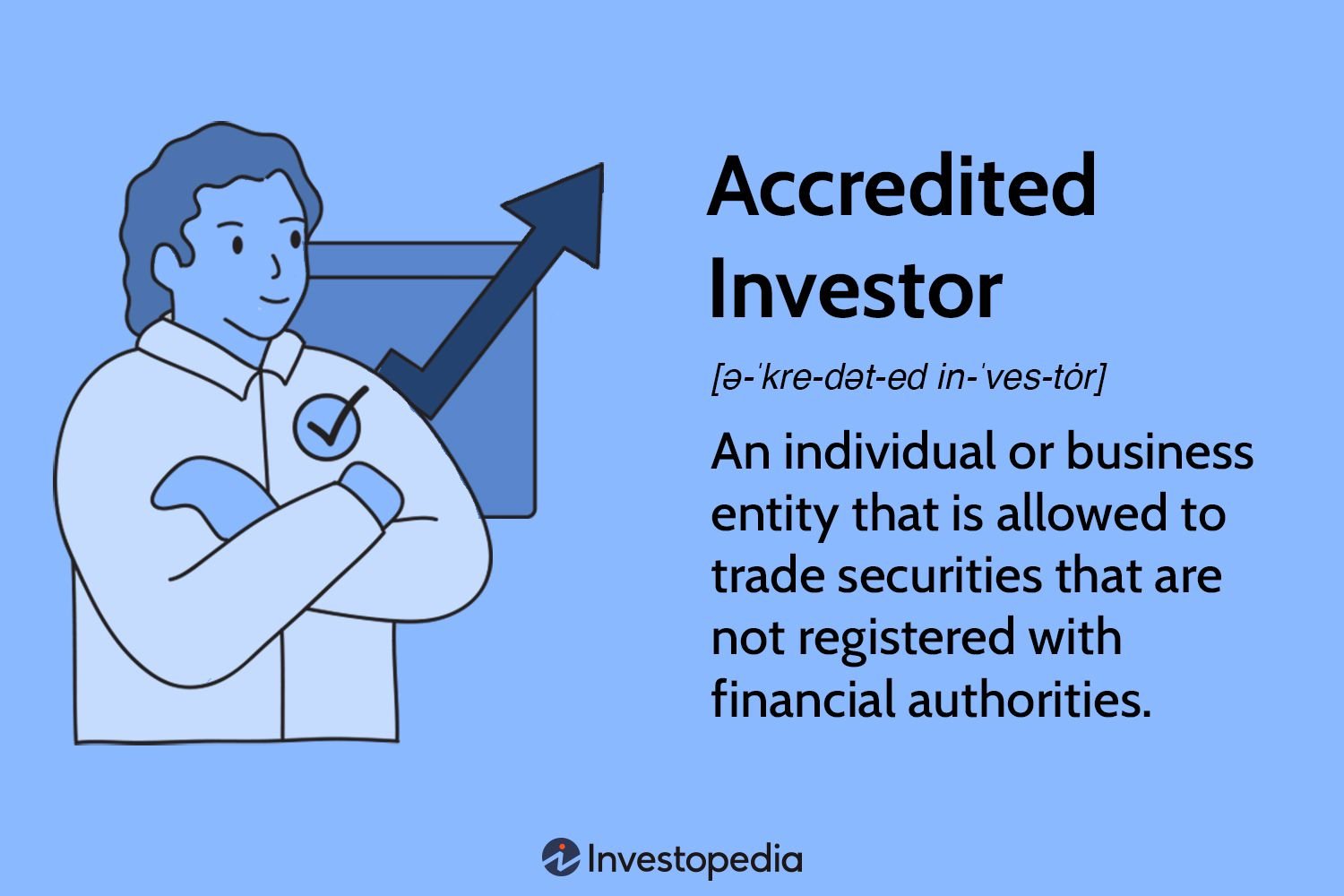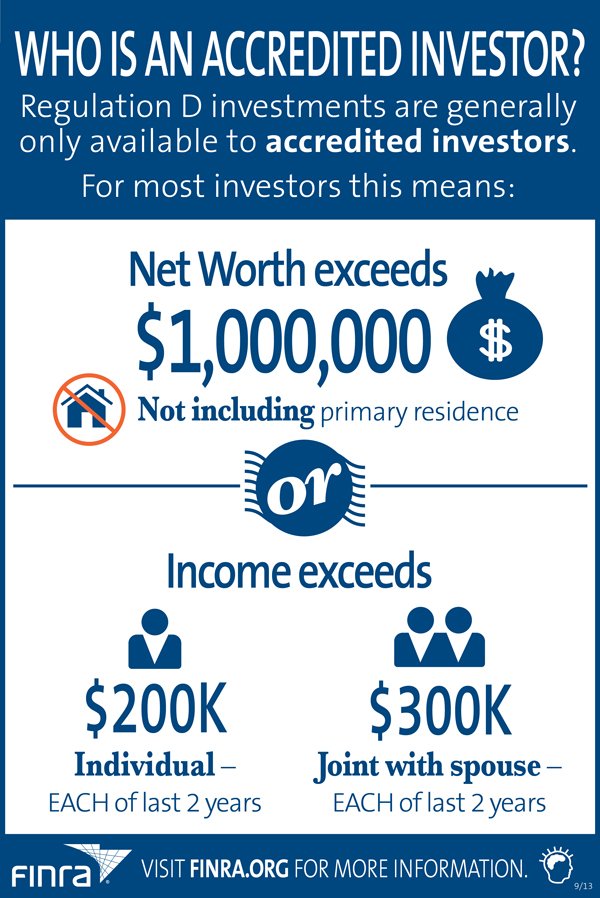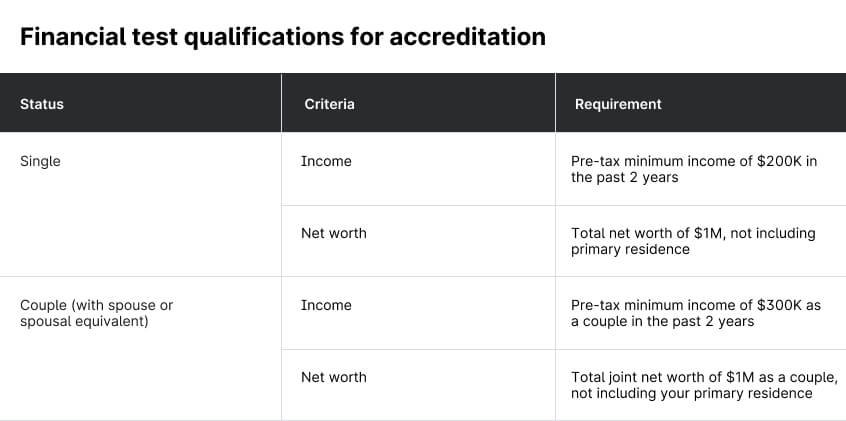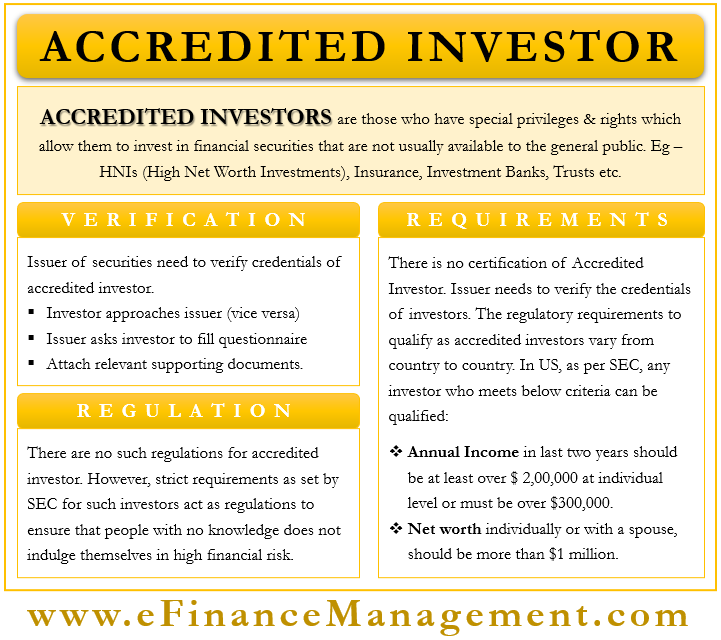Are you a student aspiring to establish a career in the USA? If so, understanding how to become an Accredited Investor in the country is crucial. This accreditation opens doors to exclusive investment opportunities that can enhance your financial prospects. From gaining access to private equity investments to participating in certain crowdfunding platforms, becoming an Accredited Investor allows you to tap into a realm of possibilities. In this article, we will guide you through the process of becoming an Accredited Investor in the USA, equipping you with the knowledge needed to take advantage of these unique investment avenues.

This image is property of www.investopedia.com.
Requirements for Accredited Investor Status
Income Requirement
To qualify as an accredited investor in the United States, you must meet certain income and net worth requirements. The income requirement states that for an individual to be considered an accredited investor, their income must have exceeded $200,000 in each of the previous two years, with the expectation of reaching the same income level in the current year. For a joint income requirement, the threshold increases to $300,000 for married couples filing jointly.
Net Worth Requirement
In addition to the income requirement, an individual can also qualify as an accredited investor if their net worth exceeds $1 million, either individually or jointly with their spouse. The net worth requirement is a measure of an individual’s financial strength and stability and takes into account all assets such as real estate, investments, and personal property, while excluding the value of the individual’s primary residence.
Joint Income and Net Worth Requirement
For individuals who are married and filing jointly, there is a special provision that combines the income and net worth requirements. In this case, the joint income and net worth must exceed $300,000 and $1 million, respectively. This provision allows for flexibility in meeting the requirements for accredited investor status and recognizes the shared financial responsibility between spouses.
Spousal Equivalents
To ensure fairness, the Securities and Exchange Commission (SEC) recognizes spousal equivalents as being eligible for accredited investor status. This includes individuals who have a relationship equivalent to marriage, such as domestic partners and long-term companions. The SEC recognizes that financial stability and investment opportunities should not be limited to traditional married couples and extends the qualification criteria to include spousal equivalents.
Entity Accredited Investor
Not only individuals but also certain entities can qualify as accredited investors. These entities include corporations, partnerships, limited liability companies (LLCs), and other organizations with a high net worth, as defined by the SEC. It is important to note that not all entities automatically qualify, and they must meet specific criteria set by the SEC to be considered as accredited investors.
Employee Benefit Plans
Employee benefit plans, such as pension funds or retirement plans, may also qualify for accredited investor status. These plans provide financial benefits to employees, typically through contributions made by the employer and/or the employee. To qualify, the plan must have assets in excess of $5 million, be managed by professional investment advisers, and meet certain other requirements established by the SEC.
Income Requirement
Individual Income Requirement
To meet the individual income requirement as an accredited investor, your personal income must have exceeded $200,000 in each of the previous two years, with a reasonable expectation of reaching the same income level in the current year. This requirement ensures that individuals with a stable and high income are eligible to participate in certain investment opportunities that are available only to accredited investors.
Joint Income Requirement
For married couples filing jointly, the joint income requirement is higher, with a threshold of $300,000. This recognizes the combined financial strength and stability of a married couple and allows them to qualify as accredited investors if their joint income exceeds this threshold. Joint income includes all sources of income from both spouses.
Calculation of Income
When calculating income for the purpose of meeting the accredited investor requirement, you should consider all taxable income sources, such as wages, salaries, bonuses, rental income, and investment income. Certain deductions and exclusions may be allowed, so it is advisable to consult a tax professional to ensure accurate calculation.

This image is property of i2.wp.com.
Net Worth Requirement
Individual Net Worth Requirement
The individual net worth requirement is a key criterion for qualifying as an accredited investor. An individual’s net worth must exceed $1 million, either individually or jointly with their spouse. Net worth is calculated by subtracting the total liabilities from the total assets. However, the value of the individual’s primary residence is excluded from the net worth calculation.
Joint Net Worth Requirement
For married couples filing jointly, the joint net worth requirement still stands at $1 million. This means that their combined assets, excluding the value of their primary residence, must exceed this threshold in order to meet the accredited investor net worth requirement.
Calculation of Net Worth
When determining net worth, it is important to consider all relevant assets, including investment accounts, real estate properties, retirement accounts, and personal property such as vehicles and collectibles. Liabilities, such as mortgages, loans, and credit card debts, should be subtracted from the total value of assets to arrive at the net worth figure.
Joint Income and Net Worth Requirement
Criteria for Joint Income and Net Worth
For couples who are married or have a spousal equivalent relationship, the joint income and net worth requirement provides an alternative pathway for achieving accredited investor status. To meet this requirement, the joint income must exceed $300,000, and the joint net worth must surpass $1 million. The purpose of this provision is to recognize the financial strength and stability that comes from combining resources in a shared household.
Calculation of Joint Income and Net Worth
The calculation of joint income includes the combined taxable income from all sources for both spouses or spousal equivalents. Similarly, when calculating joint net worth, the total value of assets, excluding the primary residence, should be combined, and liabilities should be subtracted. This joint calculation ensures that both partners’ financial situations are taken into account when determining eligibility for accredited investor status.

This image is property of cdn2.yieldstreet.com.
Spousal Equivalents
Definition of Spousal Equivalent
Spousal equivalents are individuals who have a relationship equivalent to marriage, but without being legally married. This includes domestic partners, long-term companions, and individuals in civil unions. Recognizing the evolving nature of relationships, the SEC extends the eligibility criteria for accredited investor status to spousal equivalents. This ensures that all couples, irrespective of legal marriage status, have equal access to investment opportunities.
Requirements for Spousal Equivalents
To qualify as a spousal equivalent, you must meet certain criteria established by the SEC. These requirements may vary depending on the jurisdiction and the specific circumstances of the relationship. It is important to consult legal professionals to understand the specific requirements in your jurisdiction and ensure compliance with the regulations.
Maintaining Spousal Equivalents Status
Once accredited investor status has been granted to a spousal equivalent, it is important to maintain the eligibility criteria. Changes in the relationship, such as dissolution or separation, may impact the accredited investor status. It is crucial to stay informed about any changes in the regulations and proactively address any potential impact on the accredited investor status.
Entity Accredited Investor
Criteria for Entity Accredited Investor
Entities, such as corporations, partnerships, limited liability companies (LLCs), and other organizations, can qualify as accredited investors if they meet specific criteria set by the SEC. The criteria include having a high net worth, defined as having assets over $5 million, or being an entity solely composed of accredited investors. The purpose of allowing entity accreditation is to provide investment opportunities to organizations with the financial capacity to bear potential risks.
Types of Entities Eligible for Accredited Investor Status
Various types of entities are eligible for accredited investor status, including financial institutions, insurance companies, pension funds, and registered investment advisers. Additionally, entities with owners who individually meet the accredited investor requirements may also qualify. Understanding the specific criteria and requirements for each type of entity is essential to ensure compliance with regulations.

This image is property of financialfreedomcountdown.com.
Employee Benefit Plans
Eligibility of Employee Benefit Plans
Employee benefit plans, such as pension funds and retirement plans, may also qualify as accredited investors. These plans provide financial benefits to employees and are typically managed by professional investment advisers. To be eligible, employee benefit plans must have assets in excess of $5 million and be organized and operated for the benefit of employees, their beneficiaries, or both.
Requirements for Employee Benefit Plans
In addition to meeting the asset threshold, employee benefit plans must also satisfy certain other requirements established by the SEC. These requirements may include specific reporting and disclosure obligations, as well as compliance with fiduciary duties. It is important for employers and plan managers to work closely with legal and financial professionals to ensure the employee benefit plans meet all relevant requirements.
Trust Eligibility
In some cases, trusts may also qualify as accredited investors if certain conditions are met. Generally, the assets of the trust must exceed $5 million, and the trust must not have been formed for the specific purpose of acquiring the securities being offered. Trust eligibility may vary depending on the jurisdiction and the specific regulations governing trusts in that jurisdiction.
Calculation of Assets
When determining whether an employee benefit plan or trust meets the accredited investor status, the calculation of assets should include all relevant financial holdings, such as stocks, bonds, real estate, and other investments. It is essential to work with qualified professionals to ensure accurate assessment and calculation of assets to maintain compliance with SEC regulations.
Verification and Documentation
Verification Process
To establish accredited investor status, individuals and entities may be required to provide verification and documentation as evidence of meeting the relevant requirements. This verification process may involve submitting financial statements, tax records, bank statements, and other supporting documentation. The purpose of this verification process is to ensure the integrity of the accredited investor classification and protect investors and issuers.
Documents Required for Accredited Investor Status
The specific documents required to establish accredited investor status may vary depending on the circumstances and the regulations governing the investment opportunity. However, common documents that may be requested include proof of income, tax returns, bank statements, brokerage statements, and real estate valuation reports. It is important to maintain accurate financial records and be prepared to provide supporting documentation as required.
Maintaining Accredited Investor Status
Once accredited investor status has been obtained, it is important to maintain compliance with the ongoing requirements. This includes documentation of income or net worth increases to meet the income and net worth requirements. Keeping accurate financial records and actively monitoring eligibility criteria ensures that individuals and entities can continue to participate in investment opportunities reserved for accredited investors.

This image is property of efinancemanagement.com.
Investment Opportunities for Accredited Investors
Private Offerings
Accredited investors have access to a variety of investment opportunities that are not available to the general public. One such opportunity is participation in private offerings. Private offerings are investments in companies that are not publicly traded and typically involve higher risks and potential rewards. Accredited investors can invest in private equity, venture capital, and other private placement opportunities, providing them with the potential for significant returns on their investments.
Hedge Funds
Hedge funds are another investment avenue available to accredited investors. These investment vehicles pool funds from multiple accredited investors to invest across various financial markets using sophisticated strategies. Hedge funds often aim to achieve higher returns and offer diversification benefits not readily available through traditional investments. Accredited investors can take advantage of hedge funds to enhance their investment portfolios.
Venture Capital
Venture capital investments provide accredited investors with the opportunity to invest in early-stage, high-growth companies. These investments can be risky but offer the potential for substantial returns. Accredited investors partnering with venture capital firms can not only provide financial support but also contribute expertise and guidance to help nurture and grow innovative startups.
Real Estate Investments
Accredited investors can also tap into the potential of real estate investments. This can range from direct investments in commercial properties to investing in real estate investment trusts (REITs), which are publicly traded companies that pool investors’ funds to invest in various real estate assets. Real estate investments can provide regular income, capital appreciation, and serve as a hedge against inflation.
Consulting Financial Advisors
Importance of Seeking Professional Advice
When contemplating investment opportunities as an accredited investor, it is crucial to seek professional advice. Qualified financial advisors can provide valuable insights, analyze investment prospects, and help evaluate risk profiles. Their expertise can assist in formulating a comprehensive investment strategy that aligns with individual financial goals and risk tolerance. By enlisting the assistance of financial advisors, accredited investors can make more informed investment decisions.
Finding a Qualified Financial Advisor
To find a qualified financial advisor, it is recommended to research and interview potential candidates. Seek advisors who specialize in accredited investor requirements and have experience in the specific investment opportunities you are considering. It is also essential to ensure that the financial advisor is properly registered and regulated by the appropriate authorities.
Evaluating Investment Opportunities
A financial advisor can assist in evaluating investment opportunities, considering factors such as risk, return potential, liquidity, and diversification. They can help analyze investment documents, perform due diligence, and provide recommendations based on their expertise. With the guidance of a financial advisor, accredited investors can make informed investment decisions and navigate complex investment landscapes more effectively.
In conclusion, becoming an accredited investor in the United States opens up a world of investment opportunities. By meeting the income or net worth requirements, individuals, spousal equivalents, and certain entities can qualify for this status. Through private offerings, hedge funds, venture capital, and real estate investments, accredited investors gain access to potentially lucrative investments. Consulting with qualified financial advisors is highly recommended to navigate the requirements, evaluate investment opportunities, and maximize investment outcomes.